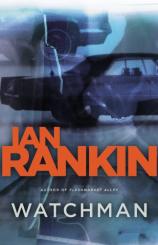Watchman
Review
Watchman
In
the introduction to WATCHMAN, being published for the first time in
the United States, Ian Rankin tells readers that the book is a spy
novel and that he used his "page-a-day" diary from 1986-1988 as
source material. This, he maintains, was because it allowed him "to
place [the narrative] in historical context. He says that in 1988
he was ready to write his second novel, either "Rebus 2 or The
Watcher." As he thought this through, he was drawn to the spies,
and the result is WATCHMAN.
Rankin goes on to say that both his new hero, John Rebus (KNOTS AND
CROSSES), and Miles Flint of MI5 are "worldly wise," yet "The
difference between the two men is that while Rebus is a man of
action…Miles…is a professional voyeur." And as this
book unfolds, Miles is transformed from being only an invisible
watcher into "real ruthless activity."
As in most spy novels, nobody really can trust anyone else. Each
man (back in 1988, and still today, few women cavort in this genre)
is out for himself and will do almost anything to get closer to a
promotion. The tangled webs woven by both the good and bad guys
somehow tend to weave themselves together, creating tension,
suspense and fast-paced plots. Such is the case with WATCHMAN. As
in the novels of John le Carre and Graham Greene, things at the
agency are not what they seem, and the word "mole" finds a new
meaning. Rankin's anti-hero, Miles Flint, is most similar to the
Smiley of the Circus novels, albeit not quite as cerebral or
intuitive.
Film buffs may remember the spy-spoof movies of the 1960s whose
main character was also named Flint: In Like Flint and
Our Man Flint. Rankin says, "I'm guessing that Miles Flint
took his surname from [that] character." Another "Flintism" is his
interesting if strange hobby --- beetles! He attaches the
personality traits of his colleagues to the variety of creepy
crawlies he keeps. Despite his years as a spy, he has been able to
maintain a certain level of "innocence" --- until now.
Like Smiley, Miles is in a dissolving marriage and has become
expendable to his masters. While knowing "something stinks in the
state of" MI5, he has trouble believing that his colleagues are as
corrupt or more so than their enemies. When he finds himself in
league with a killer who may be after him, he finds inner strengths
to fight his foe. As WATCHMAN unfolds, Miles at first is seen as
neurotic and perhaps a bit paranoid; he drops a piece of
silverware, to get a peek under the table and see if a bug is
planted there, and naively believes that no one is on to him.
Readers may be reminded of the sign that hangs in Agent Mulder's
X-Files office: "TRUST NO ONE."
People at work are suddenly retiring, being sent on strange
dead-end missions or just displaying bizarre behaviors as Flint
looks on. How is it possible for "his last suspect to know more
about Miles's assignment than Miles did?" His loss of innocence and
his own investigation may be the only way for him to survive his
own execution. Even his wife is appalled when she realizes that her
husband is now an outcast and, in some sense, a rogue agent bent on
dismantling the agency.
Another important "character" in this book is terrorism in the form
of IRA bombs exploding in London. People are getting killed, and
ironically the perpetrator might be an Arab, code-named "Latchkey."
On the night when the watchmen set out to capture him, everything
goes wrong and an Israeli diplomat is murdered. Miles is blamed for
the "cock-up," and his time in the firm may be coming to a dismal
and deadly close. When he is sent on a mission to Belfast to arrest
two supposed terrorists, he soon realizes that he has been duped
into taking on a suicide mission and has only two choices.
With the re-release of WATCHMAN, Rankin said in an interview:
"Re-reading the book recently, I was struck by how fast it moves,
cutting quickly from one scene to another, its elliptical,
breathless style marking it as a young man's work, a story by
someone in thrall to the possibilities of narrative. Strange, too,
that it should be such a period piece: almost no one owns a mobile
phone, and Miles doesn't even own a computer. I was pleased to see
so many in-jokes along the way."
Twenty years after bursting onto the literary scene as a composer
of poetry and writer of short stories, one of which became the
first Rebus novel, Ian Rankin's star hangs high and shines
brightly. Clearly he is a master of language, plot, characters,
narrative and creating suspense. His work is no longer pigeonholed
as genre fiction; rather it has risen to the level of literary
fiction.
Reviewed by Barbara Lipkien Gershenbaum on January 24, 2011





